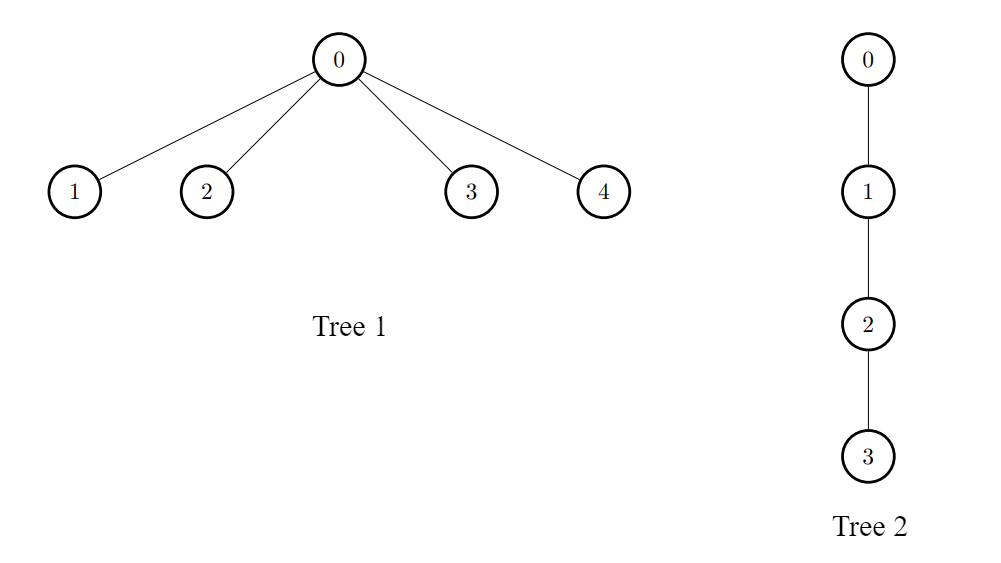LeetCode in Kotlin
3373. Maximize the Number of Target Nodes After Connecting Trees II
Hard
There exist two undirected trees with n and m nodes, labeled from [0, n - 1] and [0, m - 1], respectively.
You are given two 2D integer arrays edges1 and edges2 of lengths n - 1 and m - 1, respectively, where edges1[i] = [ai, bi] indicates that there is an edge between nodes ai and bi in the first tree and edges2[i] = [ui, vi] indicates that there is an edge between nodes ui and vi in the second tree.
Node u is target to node v if the number of edges on the path from u to v is even. Note that a node is always target to itself.
Return an array of n integers answer, where answer[i] is the maximum possible number of nodes that are target to node i of the first tree if you had to connect one node from the first tree to another node in the second tree.
Note that queries are independent from each other. That is, for every query you will remove the added edge before proceeding to the next query.
Example 1:
Input: edges1 = [[0,1],[0,2],[2,3],[2,4]], edges2 = [[0,1],[0,2],[0,3],[2,7],[1,4],[4,5],[4,6]]
Output: [8,7,7,8,8]
Explanation:
- For
i = 0, connect node 0 from the first tree to node 0 from the second tree. - For
i = 1, connect node 1 from the first tree to node 4 from the second tree. - For
i = 2, connect node 2 from the first tree to node 7 from the second tree. - For
i = 3, connect node 3 from the first tree to node 0 from the second tree. - For
i = 4, connect node 4 from the first tree to node 4 from the second tree.

Example 2:
Input: edges1 = [[0,1],[0,2],[0,3],[0,4]], edges2 = [[0,1],[1,2],[2,3]]
Output: [3,6,6,6,6]
Explanation:
For every i, connect node i of the first tree with any node of the second tree.

Constraints:
2 <= n, m <= 105edges1.length == n - 1edges2.length == m - 1edges1[i].length == edges2[i].length == 2edges1[i] = [ai, bi]0 <= ai, bi < nedges2[i] = [ui, vi]0 <= ui, vi < m- The input is generated such that
edges1andedges2represent valid trees.
Solution
import kotlin.math.max
class Solution {
fun maxTargetNodes(edges1: Array<IntArray>, edges2: Array<IntArray>): IntArray {
val n = edges1.size + 1
val g1 = packU(n, edges1)
val m = edges2.size + 1
val g2 = packU(m, edges2)
val p2 = parents(g2)
val eo2 = IntArray(2)
for (i in 0..<m) {
eo2[p2[2][i] % 2]++
}
val max = max(eo2[0], eo2[1])
val p1 = parents(g1)
val eo1 = IntArray(2)
for (i in 0..<n) {
eo1[p1[2][i] % 2]++
}
val ans = IntArray(n)
for (i in 0..<n) {
ans[i] = eo1[p1[2][i] % 2] + max
}
return ans
}
private fun parents(g: Array<IntArray>): Array<IntArray> {
val n = g.size
val par = IntArray(n)
par.fill(-1)
val depth = IntArray(n)
depth[0] = 0
val q = IntArray(n)
q[0] = 0
var p = 0
var r = 1
while (p < r) {
val cur = q[p]
for (nex in g[cur]) {
if (par[cur] != nex) {
q[r++] = nex
par[nex] = cur
depth[nex] = depth[cur] + 1
}
}
p++
}
return arrayOf<IntArray>(par, q, depth)
}
private fun packU(n: Int, ft: Array<IntArray>): Array<IntArray> {
val g = Array<IntArray>(n) { IntArray(0) }
val p = IntArray(n)
for (u in ft) {
p[u[0]]++
p[u[1]]++
}
for (i in 0..<n) {
g[i] = IntArray(p[i])
}
for (u in ft) {
g[u[0]][--p[u[0]]] = u[1]
g[u[1]][--p[u[1]]] = u[0]
}
return g
}
}

